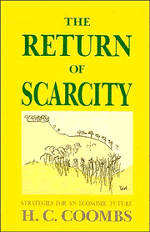Book contents
- Frontmatter
- Contents
- Introduction
- 1 Towards a Sustainable Society
- 2 Scarcity, Wealth and Income
- 3 Matching Ecological and Economic Realities
- 4 Science and Technology - For What Purpose?
- 5 Economic and Ecological Issues in Resource Management
- 6 Resource Management and Environmental Law
- 7 The Quality of life and Its Assessment
- 8 Is Democracy Alive and Well?
- 9 Technology, Economic Change and Political Strategy
- Bibliography
5 - Economic and Ecological Issues in Resource Management
Published online by Cambridge University Press: 05 August 2012
- Frontmatter
- Contents
- Introduction
- 1 Towards a Sustainable Society
- 2 Scarcity, Wealth and Income
- 3 Matching Ecological and Economic Realities
- 4 Science and Technology - For What Purpose?
- 5 Economic and Ecological Issues in Resource Management
- 6 Resource Management and Environmental Law
- 7 The Quality of life and Its Assessment
- 8 Is Democracy Alive and Well?
- 9 Technology, Economic Change and Political Strategy
- Bibliography
Summary
Originally published in A.B. Costin and HJ. Frith (eds), Conservation, Harmondsworth: Penguin (revised edition, 1974).
THE professional training of an economist and the experience of a central banker are not necessarily adequate to deal with the problems of resource allocation in the public domain where the application of economic principles is frequently inhibited by the desire to apply a different set of values and tests of efficiency, different from those which govern their allocation by market processes - perhaps especially in relation to water resources from which I shall draw most of my examples.
I propose, therefore, to look at the problem of water resource management as an example of the more general issues of resource allocation in a society whose economic system is a mixture of market-motivated enterprise and morally or politically motivated interventions by governments and their agents. In this I would hope to consider what traditional economic analysis and techniques may be able to contribute, what appear to be their inadequacies, and hopefully perhaps to suggest where you may usefully look for help in the solution of the problems which face you.
It is, I suppose, unnecessary to emphasise to you at any rate that water is a scarce resource. A glance at a map of the world showing the distribution of population illustrates very clearly the relationship between people and water in the form of precipitation or perhaps of river flow, and in Australia it is already clear that water supply sets the effective limit to population growth in practically all parts of this, the driest continent.
Information
- Type
- Chapter
- Information
- The Return of ScarcityStrategies for an Economic Future, pp. 83 - 96Publisher: Cambridge University PressPrint publication year: 1990
